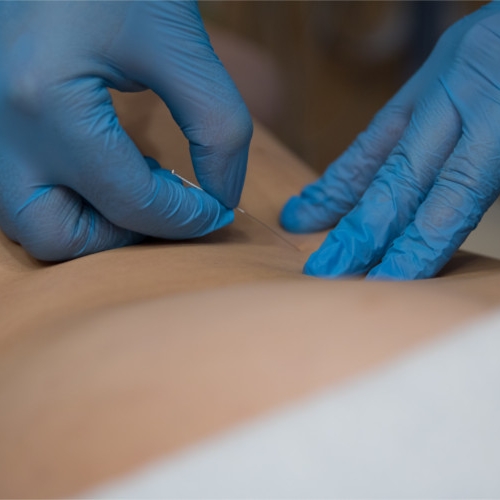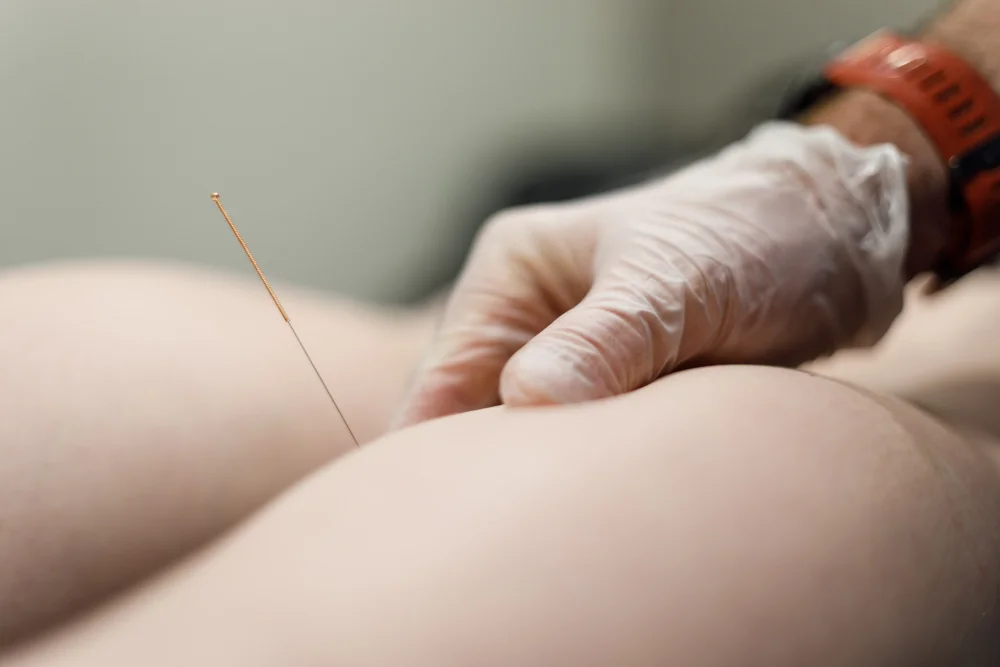Gunn Intramuscular Stimulation at Lake Country Physiotherapy
What is Gunn IMS?
Do you suffer from joint and muscle pain or have a limited range of motion due to a chronic pain condition? Does your pain persist no matter what you do? There are several treatments available to you here at Lake Country Physiotherapy, and Gunn IMS is one that may be successful in treating your pain problem.
Gunn IMS, or intramuscular stimulation, is grounded in Western Medical Science. This treatment approach is based on a “neuropathic model of musculoskeletal dysfunction developed by Dr. C. Chan Gunn.” IMS treatment involves dry needling of affected areas of the body (using a sterile acupuncture needle) without injecting any substance.


What To Expect With IMS & Dry Needling
With certain types of treatment in the physiotherapy world, there is a good bit of hearsay about what is and isn’t considered painful in terms of treatment options. With IMS treatment, penetration of a normal muscle is virtually painless; however, a shortened, hypersensitive muscle will ‘grasp’ the needle in what can be described as a cramping sensation.
The result is threefold: one, a stretch receptor in the muscle is stimulated, producing a reflex relaxation (lengthening); two, the needle also causes a small injury that draws blood to the area, initiating the natural healing process via platelet-derived growth factor; three, the treatment creates an electrical potential in the muscle to make the nerve function normally again.
It may sound intimidating to read about, however, rest assured that our physiotherapists at Lake Country Physiotherapy are highly trained in the use of IMS treatment to relieve persistent myofascial pain conditions.
What Conditions Can IMS Treat?
The three distinct categories of pain: Nociception, Inflammation, and Neuropathy.
Nociception
The immediate response conveyed to the brain, signaling tissue injury (noxious input). An example is the response from a slap to the skin.
Inflammation
A local response to cellular injury resulting in redness, swelling, heat, pain and sometimes loss of function, and that serves as a mechanism initiating the elimination of noxious agents and facilitating the healing process.
Neuropathy or Radiculopathic Pain:
Ongoing pain with no obvious signs caused by a malfunction in the peripheral nervous system, leading to supersensitivity in the pain sensory system.
Neuropathy is a relatively new word, specifically referring to any functional disturbances or pathological changes in the Peripheral Nervous System (PNS); though it is often used incorrectly to describe the nervous system as a whole. It is imperative to distinguish these entities as separate, since they show different outcomes and presentations. The CNS is well-protected by the skull and the spine, unlike the often overlooked PNS, which is much more vulnerable to damage and denotes the greatest number of chronic pain cases.
Medical professionals are apt to treat pain in the first two categories, but are perplexed by pain that shows no sign of tissue damage or inflammation. Long-term pain can exist in ongoing nociception/inflammation such as a fracture or rheumatoid arthritis (treated with surgery or anti-inflammatory drugs), a psychogenic disorder such as clinical depression (treated with medication or counseling), or most commonly neuropathic pain (explained further below). Neuropathic pain has several indicators:
- There is pain in the absence of ongoing tissue damage.
- There is a delay in the onset of pain after a precipitating injury.
- Mild stimuli are very painful.
- There may be a stabbing component.
- Pronounced summation and after-reaction from stimuli (ie. the pain gets worse with exercise).
This explains why you might feel fine immediately following a car accident, but a week later complain of whiplash. The most common cause of neuropathy is everyday wear and tear or overuse. The significance of this discovery is that disorders such as low back pain, whiplash, frozen shoulder, tennis elbow, fibromyalgia, myofascial pain, and Achilles tendinopathy are all physiologically the same.
Book Online with us today to get started towards your journey to better health!

How to Get Started
Request An Appointment
Call us at 705-327-7876 or book online to get started.
Get A Custom Treatment Plan
Our team will create a treatment plan specific to your injury and needs.
Recover & Enjoy Life Pain-Free!
Our goal is to get you back to feeling great and living the life you want

